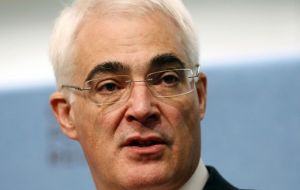MercoPress. South Atlantic News Agency
British Chancellor warns banks about interest rates
 The advantage of low interests must be passed on, insists Darling
The advantage of low interests must be passed on, insists Darling Britain’s Chancellor of the Exchequer Alistair Darling has told bank chiefs that businesses should be given the lowest possible interest rates on borrowing.
In a Whitehall meeting, the Chancellor warned the Government would be scrutinising lenders to ensure they did not charge any more than was “absolutely necessary”. But he also admitted that ministers could not step in and force banks to hand out cash to companies.
The “robust” discussions at the UK Treasury, which were also attended by Business Secretary Lord Mandelson came amid concerns that problems with the availability and cost of credit is holding back economic recovery.
Senior executives from banks including HSBC, Barclays, Lloyds and Royal Bank of Scotland were grilled on their lending practices and rates.
Speaking after the hour-long session, Mr Darling said: “I am concerned to make sure that banks do not charge any more than is absolutely necessary. The banks will say that because interest rates have come down, people are paying less now. I think that the advantage of low interest rates has to be passed on. Of course there are arrangement fees that need to be paid and so on, but I am concerned to make sure that banks do not charge any more than is absolutely necessary”.
Mr Darling said the Government would be working with ”each individual bank in this country at chief executive level“ to ensure lending was being made available and profit margins were not too high.
But asked why the Government did not do more to intervene in the actions of taxpayer-owned banks, he stressed that it was for individual lenders to decide on ”credit worthiness“.
”Really only banks can make that decision,“ he said. ”The Government can't sit behind the bank counter and take that decision themselves. What the Government can do though is enter into agreements which we have that mean that where there is a commitment to make money available for mortgages or to make money available for businesses, the money is actually there, that it's flowing trough the system and it's reasonably priced and there is the availability of funds.
“Now that's what we're doing - they have to make the individual business judgments but we need to ensure the agreements they entered into are honoured.”
A report by financial website Moneyfacts said banks had increased the interest rates they charge for personal mortgages nearly fourfold in recent months, despite the base rate remaining at a record low of 0.5%.
However Angela Knight, the chief executive of the British Bankers' Association (BSA), said banks had to pay a lot more than 0.5% for the funds they themselves borrowed in the wholesale money markets, and they had to pass this on to customers.
She said that despite this, the banks were now “stepping up” to meet the increased demand for small business loans.
Stephen Alambritis, chief spokesman for the Federation of Small Businesses, said the chancellor was “quite right to haul in the banks”.
“It is hugely important that Mr Darling keeps tabs on the banks to ensure they are lending money to firms, and at fair rates. Firms need to be able to reap the benefits of the historically low base rate,” he said.




Top Comments
Disclaimer & comment rulesCommenting for this story is now closed.
If you have a Facebook account, become a fan and comment on our Facebook Page!